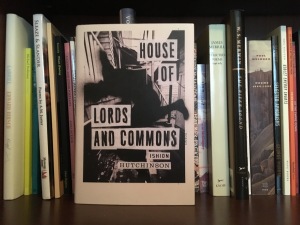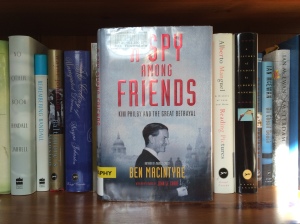All the Way to Canada Just to Have an Orgasm
Curtis Sittenfeld, American Wife (2008)
Who has never looked at a couple and wondered, How did she ever end up with him? This must, surely, be close to a universal experience. And, among recent American politicians, it’s hard to imagine that any couple could have inspired that question more often than Laura and George W. Bush. How did this quiet, intelligent, book-loving librarian end up with a man who seems, at times, little more than an aging frat boy?
American Wife is Curtis Sittenfeld’s attempt to answer that question through fiction. Loosely based on the life of Laura Bush (though the action is transferred from Texas to Wisconsin), the novel tells the story of elementary school librarian Alice Lindgren, who meets Charlie Blackwell, the wastrel son of a rich political family, at a backyard barbecue, falls in love with him, and marries him after only a couple of months. To Alice’s surprise as much as anyone else’s, Charlie, a borderline alcoholic and incompetent businessman, gives up drinking, finds religion, and goes on to become governor of Wisconsin and then President of the United States. (If you’re interested in further background on the novel, Sittenfeld wrote a fascinating article about Laura Bush back in 2004, which provides some insight into how, even at that time, she had begun to see her as an ideal character for a novel.)
The real heart of the book, for me at least, was the description of Alice and Charlie falling in love. The story is told from Alice’s perspective, in the first person, and I suppose I expected that at some point Alice would offer an explanation or a justification of why she decided to marry Charlie. (This would be in keeping with Alice’s character, as other parts of the book portray her as a thoughtful, rational woman who carefully considers her options before making decisions.) But Sittenfeld does something much more unexpected and striking: she uses this portion of the book to paint a remarkably convincing portrait of the irrationality of eros. Alice falls in love with Charlie not for any particular reason or reasons, but quite simply without reason; she can’t explain it because there is no explanation, and if asked for one, she might reply, with Catullus, “nescio, sed fieri sentio”. And so the answer to the central mystery — how did she end up with him? — turns out to be another mystery, the mystery of love itself. I found the essential reticence of this answer — the insistence that some things are simply inexplicable — strangely satisfying, and all the more so because it seemed so out of character for Alice.
But What About Canada?
Part of the plot involves Charlie becoming part owner of the Milwaukee Brewers, and so there are one or two references to the Toronto Blue Jays (and one to Paul Molitor, a Brewers player who went on to win a World Series with Toronto) that are just passing mentions and don’t really seem worth cataloguing. There are a couple of other passages that are a little more interesting, though.
A Distant Landmark
This scene occurs early in Alice’s relationship with Charlie, when they are kissing in his car:
Charlie pulled back an inch. “So I haven’t forgotten about what I owe you. Let’s go to my place.”
Confused, I said, “You don’t owe me anything.” And then I understood — he was grinning — and I said, “Oh, that.”
“I’m not taking no for an answer. You’ve got to claim what’s rightfully yours.”
And even though, as I drove, I felt stirrings of nervous anticipation, I also wanted to just stay forever in this limbo; I’d have been content to drive all the way to Canada, knowing that something wonderful would happen when we got there. (163)
What Charlie “owes” Alice is an orgasm, which didn’t happen the first time they had sex. Canada, in this passage, serves as a marker of distance; it’s the furthest place Alice can imagine driving to, as if to say, I’m enjoying the anticipation so much that I’d drive all the way to Canada — and what could be further than that? — before Charlie goes down on me. Of course Canada isn’t really that far from Wisconsin — even another American location, like Texas or Florida, would stretch the anticipation out a lot longer. But because Canada is a separate country, it has an aura of distance, even if it isn’t physically further away than a lot of points in the U.S.
And perhaps we’re meant to think that Alice doesn’t really want to wait that long anyway.
Bizarre Geography Triangle
This scene takes place at Halcyon, the Blackwell family retreat on the shores of Lake Michigan (modelled, presumably, on the Bush family “compound” at Kennebunkport) when Charlie takes Alice there to meet his family for the first time:
I subsequently found myself in a conversation with Uncle Trip, also loquacious, who explained that he divided his time — for reasons of business or pleasure, I could not discern — among Milwaukee, Key West, and Toronto. This seemed to me at the time to be the oddest triangle imaginable, but really, for the Blackwells’ friends, it proved not to be particularly unusual at all. Milwaukee and Sun Valley, Milwaukee and the Adirondacks, Minneapolis and Cheyenne and Phoenix, Chicago and San Francisco. They sold textiles, or mined ore, or owned a gallery in Santa Fe, or they were consultants — this was before consulting was as common as it is today — or they had just taken a cruise around the the Gulf of Alaska, and it had, they reported, been marvelous. (223-24)
Maybe it’s just my preconceptions showing, but I can’t help feeling that it is Toronto, specifically, that makes the original list of places seem so odd. Alice herself immediately suggests that it isn’t as odd as it seemed to her at first, and goes on to list other groupings of places, presumably representing where other friends of the Blackwell family divide their time. But there is no other Canadian location in any of these groupings, which, to me, actually reinforces the oddity of the original list. Having a place in Chicago and one in San Francisco really doesn’t strike me as that strange, but Toronto — a city in another country — that does seem out of the ordinary. And what could possibly be in Toronto? It’s not a Canadian cottage, since these people already have their place on Lake Michigan.
I suppose we’ll never know.










